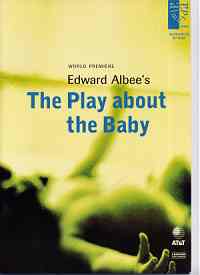
Review/Time International/14.9.98
Review / London Evening Standard/2.9.98 (below)
|
|
Review/Time International/14.9.98 Review / London Evening Standard/2.9.98 (below) |
|
There is nothing more disturbing or mysterious on the London stage than this world premiere by Edward Albee. His play about a stolen baby confirms his status as America's most daring and difficult dramatist. His compatriots Arthur Miller, Sam Shepard and David Mamet tread familiar, predictable paths by comparison. The Play About The Baby, which harks back to the old Theatre of the Absurd and Pirandello's artfulness for stylistic inspiration, resists simple answers. And there's no denying the lure of its unsettling oddness. |
 |
A young married couple lose their baby and, as they succumb to elemental fear and grief, are successfully urged to deny that it even existed. Both of them fall in with this bizarre suggestion. What on earth is going on? Tim Hatley's stage design, an empty walled room, with a couple of chairs, hints at something strange. It conjures up a yawning void. The girl and a boy - as described in the cast list - are in their early twenties and happily married with a baby in tow. Their sexy, contented existence is interrupted by the ominous appearance of Alan Howard and Frances de la Tour.
This stylish, witty duo play a middle-aged man and woman who seem sinisterly intent upon ruining the married couple's peace of mind. To those who demand to know why all this is happening, no ready answer comes. Albee discursively conjures up nightmare situations of extreme anxiety where rationality vanishes. Perhaps he is dealing with worlds where people's worst fantasies come true and ordinary contentedness is threatened by implacable strangers. Perhaps he suggests, as often before, that illusion and fantasy are the addictive drugs by which we live.
True to the Theatre of the Absurd, he settles none of the nagging questions that he provokes. This is terrain far removed from realism's order and security. A baby is born within a few seconds of the girl's recorded screams in the opening scenes. At first there's just an atmosphere of nagging bewilderment. The young couple cannot understand who the older, jocular couple are, why they have intruded and what they are up to. On this tantalising line of curiosity the play depends.
Albee never allows this middle-aged pair in their witty reminiscing and worldly reflections to forget that they are addressing a theatre audience. Frances de la Tour, reeking of sophisticated languor, dressed in stylish black, beautifully delivers a melodramatic account of a long lost lover, who hanged himself for lack of her. Alan Howard's wry gentleman, with his air of quizzical grandeur and flashes of cruelty, like some Beckettian maestro of darkness, is almost as well-tuned to the mode of Howard Davies's austere production.
It is, though, the young couple who bear the weight of the play's limited drama. How terrific they both are. Zoe Waite's love-smitten wife poignantly shifts to the low gears of desolate resignation. Rupert Penry-Jones, as the husband, does not flash the usual cock-sure badges of young masculinity. Instead, as Albee requires, he powerfully conveys the idea of a brittle, vulnerable man, seething with anxieties, whose nightmares shatteringly come true. The dramatic line of argument is tenuous, which makes this new Albee a demanding though serious treat.
Nicholas De Jongh
London Evening Standard. 2.9.98.